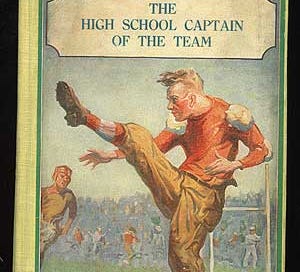A garland of quotations II
Culled from the finest hypemen in literary history, and re-woven every Monday
But Oh! poor wretch!—he read, and read, and read,
’Till his brain turned—and ere his twentieth year,
He had unlawful thoughts of many things:
•S.T. Coleridge, “The Foster-Mother’s Tale” (1798).
Evil thoughts can never be cherished, day after day, without leading the more daring or brutal into some form of crime.
•H. Irving Hancock, The High School Captain of the Team; or, Dick & Co. Leading the Athletic Vanguard (1910).
I was aghast, for now at last I knew
That I had failed to murder all in me,
One part was left—my thought was still alive!
•Princess Karadja, Mot Ljuset (1909).
It was in a dream that I saw a long straight sword lying at my side I wonder what has been foretold perhaps you will visit me •Lady Kasa, Manyôshû 604 (coll. 760).
If you lie with words, you lie badly, but if—through action—you let it be thought that others may act likewise, then you lie well, making some people believe that a certain proposition (some ps make qs) can be transformed into a universal proposition (all ps make qs). ¶But this is why ethics and rhetoric are not part of formal logic.
•Umberto Eco, “Some Reflections on War and Peace” (2002).
Julian: Unhappy I, to be born into this iron age !
Maximus: Do not reproach the age. Had the age been greater, you would have been less.
•Ibsen, The Emperor Julian (1873).
How can you have a Utopia without utopians, a Golden World with men of brass?
•Philip José Farmer, “Riders of the Purple Wage” (1967).
I begin to understand Y., who confessed last winter that he no longer dared to read Nietzsche: he prophesied and anticipated too precisely all that has happened in the West for almost a century!
•Mircea Eliade, journal (6/6/1981).
I have forgotten my umbrella.
•Nietzsche, notebook (1881).
At dinner, Claude Lévi-Strauss—very charming toward me. But we didn’t talk much. Only in the taxi did I realize I’d taken Lévi-Strauss’s raincoat by mistake.
•Mircea Eliade, journal (6/22/1979).
References: Coleridge: Wordsworth & Coleridge, Lyrical Ballads (Oxford UP, 1998); Karadja: Towards the Light: A Mystic Poem (Dodd,Mead, 1908); Kasa: in Harold Wright, trans., Ten Thousand Leaves: Love Poems from the Manyôshû (Overlook, 1985); Eco: Turning Back the Clock: Hot Wars and Media Populism (Harcourt, 2007); Ibsen: in Emperor and Galilean (Heinemann, 1911); Farmer: in Harlan Ellison, ed., Dangerous Visions (Berkley, 1972); Eliade: Journal IV (UChiP, 1990); some of this material is copyrighted, and I plead only fair use.




